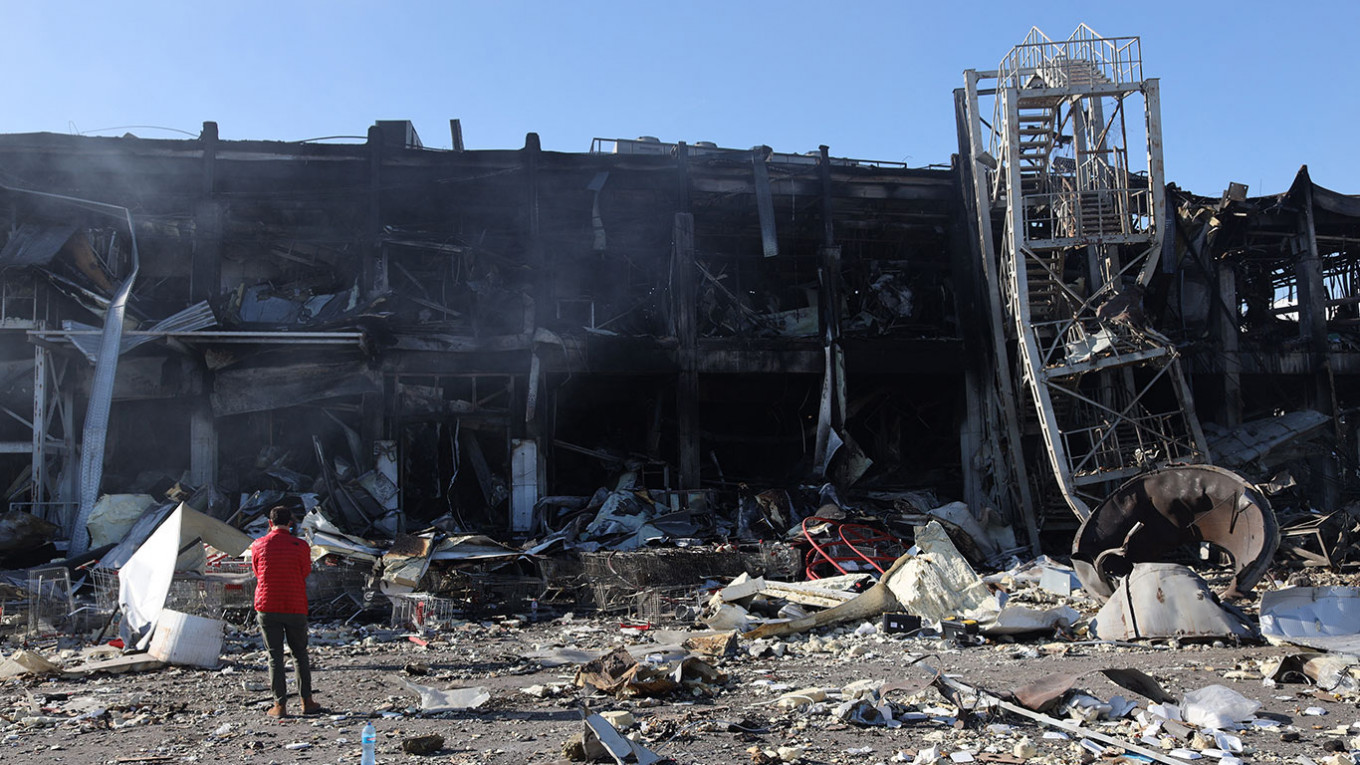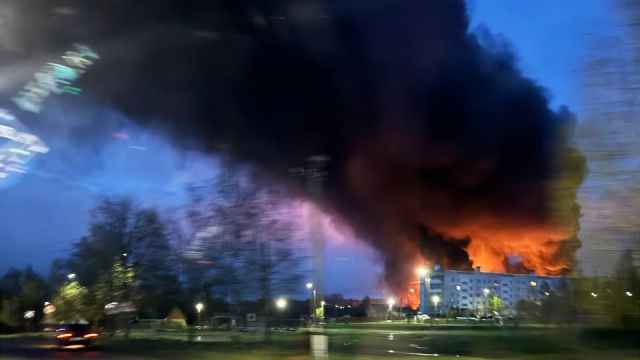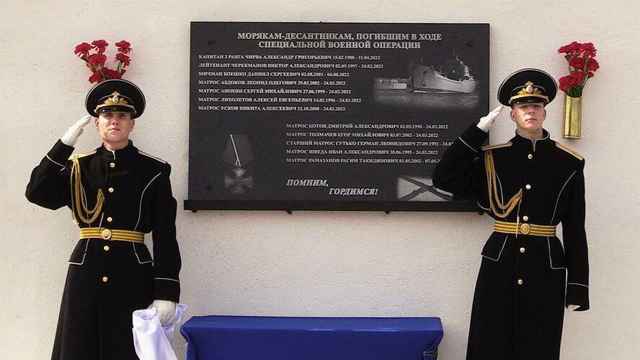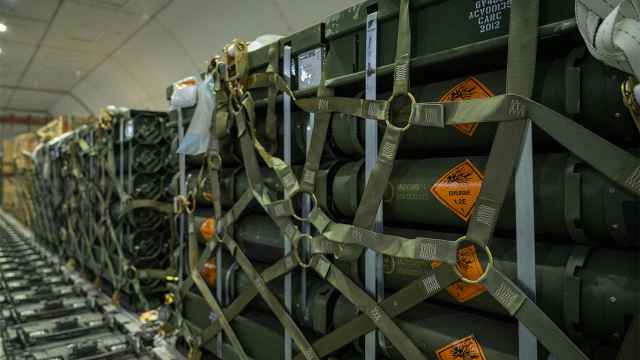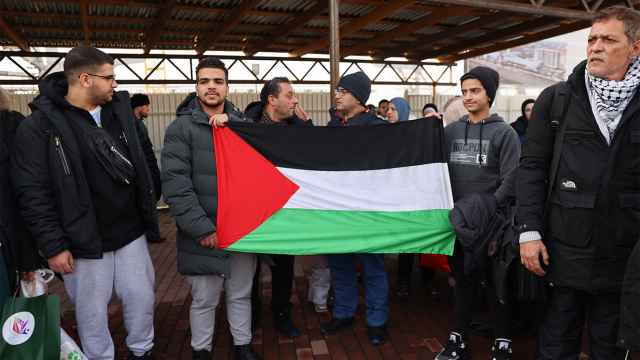Ukraine announced it will hold its first war crimes trial over the Russian invasion, as Moscow accused Kyiv of shelling a Russian city in the war's latest flashpoint.
The conflict has devastated cities and displaced millions, with fears also growing of its broader international impact as gas supplies to Europe were disrupted by a halt in Russian flows through Ukraine.
Kyiv has repeatedly accused Russian troops of committing atrocities since the invasion began on Feb. 24, and Ukrainian authorities said Wednesday they would launch the first war crimes trial of the conflict.
The prosecutor general's office said Vadim Shishimarin, a 21-year-old Russian service member, is accused of killing an unarmed 62-year-old civilian as he fled with four other soldiers in a stolen car.
"The man died on the spot just a few dozen meters from his home," said a statement from prosecutor Iryna Venediktova's office.
Shishimarin faces possible life imprisonment if found guilty.
Venediktova's office has said it has received reports of more than 10,000 alleged war crimes, with 622 suspects identified.
The Russian invasion has sparked an exodus of nearly 6 million civilians, many of whom bear accounts of torture, sexual violence and indiscriminate destruction.
The UN Human Rights Council is due to hold a special session on Ukraine on Thursday.
Moscow has focused on eastern and southern Ukraine since it failed to take Kyiv in the first weeks of its campaign.
Ukraine's forces were boosted by what Kyiv described as the recapture of four villages around the northeastern city of Kharkiv, close to the border with Russia.
In the Russian city of Belgorod, around 70 kilometers (43 miles) from Kharkiv, authorities said one person was killed and six injured by Ukrainian shelling.
Belgorod governor Vyacheslav Gladkov said it was "the most difficult situation" facing the border region since Russia sent its troops into Ukraine 11 weeks ago.
Authorities in Russian regions bordering Ukraine have repeatedly accused Ukrainian forces of launching attacks.
In April, Gladkov said Ukrainian helicopters carried out a strike on a fuel storage facility in Belgorod.
'They come in waves'
In southern Ukraine, the pro-Kremlin authorities in the city of Kherson urged Putin to annex the region.
Kherson was the first major Ukrainian city to fall in the current conflict. It lies north of Crimea, which was annexed by Russia in 2014.
Kirill Stremousov, deputy head of Kherson's Moscow-installed administration, said there would be a "request to make Kherson region a full subject of the Russian Federation."
The Kremlin replied it was up to the residents of Kherson to "determine their own fate."
Ukrainian presidential aide Mykhaylo Podolyak said Kherson would be liberated and "the invaders may ask to join even Mars or Jupiter."
Ukrainian President Volodymyr Zelensky has framed his nation's resistance to the Russian invasion as a "war against tyranny," but the fierce fightback has carried a heavy cost.
In a rare release of battle casualty figures, Ukraine's National Guard said Wednesday that 561 of its members have been killed and nearly 1,700 wounded since the invasion began.
Neither the defense ministry in Kyiv nor its counterpart in Moscow has provided official death counts, but in mid-April, Zelensky said between 2,500 and 3,000 Ukrainian soldiers had been killed.
Ukraine's effort to hold the Russian-speaking Donbas region in the east has also become increasingly desperate.
"They come in waves," volunteer fighter Mykola said of the repeated Russian attempts to push past a strategic river near a rural settlement called Bilogorivka.
NATO decision by Finland, Sweden
Much of the world has moved to isolate Putin as punishment for the invasion.
Russia "is today the most direct threat to the world order with the barbaric war against Ukraine," European Commission President Ursula von der Leyen said in Tokyo Thursday after meeting Japanese Prime Minister Fumio Kishida.
Kishida, whose government joined the tough measures against Moscow, added: "Russia's invasion of Ukraine is not just a matter for Europe, but it shakes the core of the international order including Asia. This must not be tolerated."
Russia has been hit with a wave of punishing economic sanctions that have started to take a toll on its foreign exchange reserves.
Zelensky said Wednesday that he had spoken with German Chancellor Olaf Scholz about boosting penalties on Moscow.
"Step by step we are doing everything to make the aggressor feel the biggest pain from the aggression," the Ukrainian leader said.
But ramping up the embargoes has not been straightforward, with concern among some nations in Europe that rely on Russian gas.
Kyiv said Wednesday that Russia had halted gas supplies through a key transit hub in the east.
The stoppage caused supplies to plunge by 25 percent in Germany, which is dependent on Russia for its energy and has rejected an immediate full embargo on Russian gas.
The invasion of Ukraine has also prompted Sweden and Finland to consider NATO membership.
Finland was due to reveal its position on joining the bloc on Thursday.
A mother mourns
A Ukrainian commander in Mariupol appealed directly to Elon Musk on Wednesday, asking the world's richest man to intervene on behalf of those trapped by Russian forces in the southern port city.
The war has devastated Mariupol, where Ukrainians have sustained a pocket of resistance at a steel factory.
Iryna Yegorchenko, 43, learned Wednesday that her soldier son Artem had died protecting the Azovstal plant.
"I suddenly felt relieved," she told AFP.
The 22-year-old was crushed during the collapse of a structure and "quickly went to God," said Yegorchenko, who lives in Kyiv.
"He decided to defend his homeland, his people... I have nothing to be ashamed of as a mother."
A Message from The Moscow Times:
Dear readers,
We are facing unprecedented challenges. Russia's Prosecutor General's Office has designated The Moscow Times as an "undesirable" organization, criminalizing our work and putting our staff at risk of prosecution. This follows our earlier unjust labeling as a "foreign agent."
These actions are direct attempts to silence independent journalism in Russia. The authorities claim our work "discredits the decisions of the Russian leadership." We see things differently: we strive to provide accurate, unbiased reporting on Russia.
We, the journalists of The Moscow Times, refuse to be silenced. But to continue our work, we need your help.
Your support, no matter how small, makes a world of difference. If you can, please support us monthly starting from just $2. It's quick to set up, and every contribution makes a significant impact.
By supporting The Moscow Times, you're defending open, independent journalism in the face of repression. Thank you for standing with us.
Remind me later.


